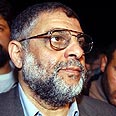
Hamas prisoner's vision: 1 state for 2 people
When he was a child Salim discovered Islam and admired assassinated Hamas leader Rantissi, but the year he spent in Israeli prison changed his opinions. Now he preaches for one democratic state in Holy Land with Lebanese-style leadership
JORDAN – "The idea of establishing a Palestinian authority, as well as the two states for two people vision, have failed miserably. The real solution is one state for two people," says a former Hamas member, who was jailed in Israel for about a year due to his activity in the Palestinian movement.
Talking to Ynet, he reveals political ideas being discussed on the Palestinian street.
Salim (alias) presents his views with a lot of confidence, but believes that it would not be wise to reveal his real name just yet. He is 25 years old and lives in the West Bank. Until 2001 he was an enthusiastic Hamas supporter and an organization activist at the An-Najah University in Nablus, one of the movement's strongholds in the West Bank.
"When I was 15 I discovered Islam. It was something amazing for me. I had religious relatives and I prayed five times a day," he says.
"I admired Abdel Aziz al-Rantissi," he says of the Hamas leader who replaced assassinated spiritual leader Shiekh Ahmad Yassin in March 2004 and was later also killed by Israel.
"I was impressed by his strong personality. My family members were also killed in different circumstances in the first intifada, in Iraq and in other places, and this also helped strengthen this feeling. I was an enthusiastic supporter of Hamas."
So what happened?
"I was arrested in 2001 on suspicion of being active on behalf of Hamas at the An-Najah University. I sat in jail and began thinking about everything. I started to realize that this was a cycle of violence that would never end.
"I understood that I did not want my children to live like this. They don't deserve it. And from this point I started the process. We had many political discussions in prison and attempts to convince each other, and I began searching for a direction.
"At first I was interested in Fatah's opinions. I turned to the administration of the prison I was jailed in, in the Negev, and asked to move from the Hamas wing to the Fatah wing, and was moved.
"The Hamas members did not understand what was happening to me. They thought I was threatened or beaten by Fatah members or that Fatah had paid me. They said I had no principles. I did not feel like I belonged there as well, and turned to the Communists.
"A year later I was released from jail. I saw Israel building the wall and I realized that a Palestinians state could not be established. I understood that the two leaders may be able to sign an agreement, but that it would not be realized in practice and that the two people would suffer.
At the same time, I met with groups of Israelis and was very impressed. I started thinking that they also had a right to exist, and this gave me the idea of one state for two people. I know many Palestinians will reject it, but one must be brave to support this idea. I believe this is an excellent solution for the problem."
Holy Land project
In the past few months, particularly since Hamas' takeover of the Gaza Strip, more and more Palestinians have been calling for disbandment of the Palestinian Authority. Salim already has a vision for the future state, and even a name: 'The Holy Land'.
"It will be a democratic country. We could agree on a one political system or another, such as, for example, allocating political positions on the basis of ethnic representation like in Lebanon, in order for demography not to harm the representation, and we could think of other methods. In any event, the state would be democratic."
And what about the refugees? Salim says they should be settled wherever they are now.
"We must improve the situation of the refugee camps in Arab countries and turn them into citizens with equal rights. And as for 'the Holy Land', its citizens will be all those living now in Israeli and Palestinian Authority territories."
Do you think your opinions stand a chance?
"Yes. In tete-a-tete meetings there are many who support me – both Palestinians and Israelis, but they don’t show it to the outside. I am being accused of normalizing the relations with Israel, but it will take time for people to apprehend this. They call me crazy, but I want to slowly nurture this idea."
In the meantime, Salim continues his PR work and continues to meet with Israelis. He found a good opportunity for such a meeting over the weekend, when he took part in an Israeli-Palestinian seminar held by the Geneva Initiative headquarters in Jordan.










